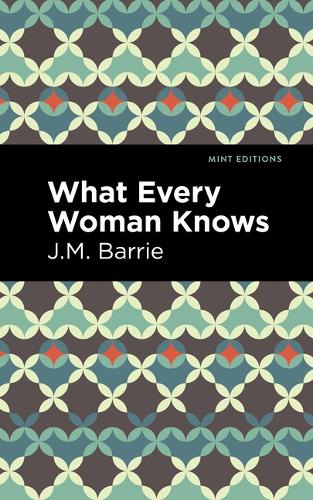
What Every Woman Knows
(Hardback)
Publishing Details
What Every Woman Knows
By (Author) J. M. Barrie
Contributions by Mint Editions
Mint Editions
Mint Editions
28th September 2021
United States
Classifications
General
Non Fiction
Comedic plays
FIC
Physical Properties
Hardback
78
Width 127mm, Height 203mm
Description
What Every Woman Knows (1908) is a play by J. M. Barrie. It ran for 384 performances at the Duke of Yorks Theatre in London and was produced on Broadway as well, making it one of the most successful plays of the year. Inspired by the womens suffrage movement, Barrie sought to explore the intersection of gender and class in Scottish aristocratic society. Adapted numerous times for film and consistently revived on stage, What Every Woman Knows is an enduring work of English theatre by an author whose reputation as the creator of Peter Pan has largely overshadowed the rest of his brilliant career. Behind every great man, an even better woman makes his success possible. In J. M. Barries masterful play, a Scottish family worried for their daughters future seizes the chance to marry her off to a promising young man. Having discovered a young university student in their vast library, they offer to pay for his education if he agrees to take Maggies hand. Left with no real choice in the matter, John Shand marries into the Wylie family and attempts to launch a career in politics. As his reputation growsdue in no small part to his wifes hard workShand begins to forget his impoverished roots, dreaming instead of a future all his own. Funny and deeply critical of the institution of marriage, What Every Woman Knows is a story of romance, ambition, and humility from a legendarily gifted Scottish storyteller. With a beautifully designed cover and professionally typeset manuscript, this edition of J. M. Barries What Every Woman Knows is a classic work of Scottish literature reimagined for modern readers.
Author Bio
J. M. Barrie (1860-1937) was a Scottish novelist and playwright. Born in Kirriemuir, Barrie was raised in a strict Calvinist family. At the age of six, he lost his brother David to an ice-skating accident, a tragedy which left his family devastated and led to a strengthening in Barrie's relationship with his mother. At school, he developed a passion for reading and acting, forming a drama club with his friends in Glasgow. After graduating from the University of Edinburgh, he found work as a journalist for the Nottingham Journal while writing the stories that would become his first novels. The Little White Bird (1902), a blend of fairytale fiction and social commentary, was his first novel to feature the beloved character Peter Pan, who would take the lead in his 1904 play Peter Pan; or the Boy Who Wouldn't Grow Up, later adapted for a 1911 novel and immortalized in the 1953 Disney animated film. A friend of Robert Louis Stevenson, George Bernard Shaw, and H. G. Wells, Barrie is known for his relationship with the Llewelyn Davies family, whose young boys were the inspiration for his stories of Peter Pan's adventures with Wendy, Tinker Bell, and the Lost Boys on the island of Neverland.
